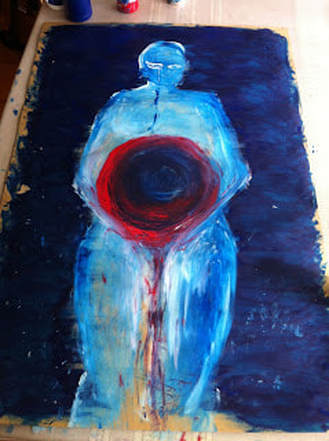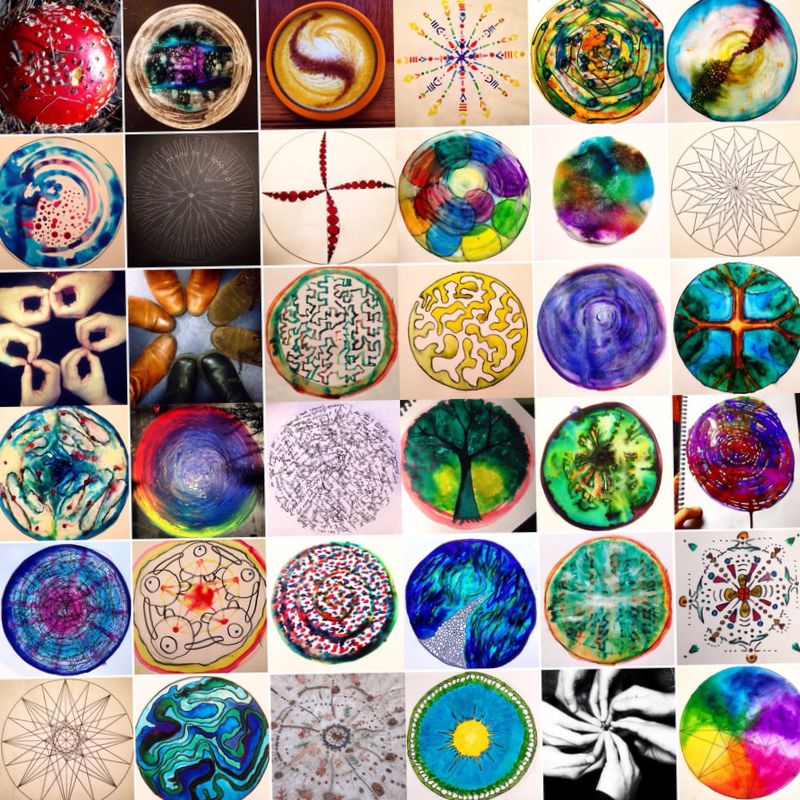|
I know that living with chronic un-wellness is really hard. I've been living with severe PMT and other menstruation-related conditions for many years. It's been a long journey, and I'm grateful to have come across some practices and frameworks that have offered support. When I was studying pastoral care (spiritual care) at La Trobe University, I learned about illness narratives as described by Arthur Frank in his book, ‘The Wounded Storyteller’. In our culture, the dominant illness narrative is the 'restitution' narrative. In this story, we are healthy, then we become unwell, we seek treatment, and we are restored to our previous state of health. Simple. Clear. Sick. Fixed. Hurrah! But we know that illnesses don't always follow this pattern. Sometimes we get sick, and we seek treatments, and none of the treatments restore us to health. There is no sense of control, and we become lost, overwhelmed and lose hope. There are no solutions to the problem, no ways to fix it. This is a 'chaos' narrative. Sometimes we move between the 'restitution' and 'chaos' narratives. Something works for a while, then it doesn’t. Or suddenly another condition emerges. And sometimes, we get sick and we seek treatment; we go to the doctor, the shaman, the healer, read self-help books and the latest research, attend workshops, and finally come to realise that this thing isn’t going to get ‘fixed’ as we hope. We need to learn to live with it. And we also realise that the journey we’re on, triggered by the illness, has lead us to come to know ourselves better, to develop a new relationship with our body, emotions, thoughts, and soul. We weave new threads of connection in our communities, find rituals and connect with something bigger than ourselves. The illness is a spiritual journey. This narrative is the 'quest' narrative. The 'quest' narrative, is where we make meaning of our lived experience. The 'quest' narrative, where our illness offers us opportunities to grow and to heal – not necessarily the physical body, but into wholeness – can be supported and cultivated through skilled companioning, such as that art therapy offers. In my own ongoing journey with PMT and Endometriosis, I've moved from 'restitution', to 'chaos', to 'quest' narratives, and sometimes back and forward between them. I've been able to dive into the experience that is presenting day to day, express difficult emotions and find meaning through personal creative arts practices including visual art, cartoons, journaling, sculpture, dancing and blogging. Art therapy sessions with skilled practitioners have helped me to recognise when I needed additional support, like enlisting the support of an integrative GP, and to connect with inner resources to get through periods of intense negative thoughts and depression. Having a witness in the journey has been profoundly supportive. I’ve come to learn that my illness actually supports my growth as a human being. My illness has led me to self-compassion practices, to deeply value rest, to work through trauma with a Somatic Experiencing practitioner, to anger work, and to studying to become an arts therapist, to name a few. My illness continues to challenge me to grow. It’s taken many years, but I can actually say I’m grateful for its gifts. If you’re living with menstrual disorder(s), and want assistance to tell your story through the creative arts and to explore your quest narrative, please get in touch. I’d love to offer you support in your journey .  A Universe Inside Her Womb. 17/8/15 This image is part way through a creative process when I was pre-menstrual and grieving that another opportunity to birth a child had passed. "Last Saturday I was weepy. I just couldn't get out of bed. Weepiness rolled into waves and cascades of tears. Sobbing. Thoughts of despair fed the tears and the tears fed the thoughts. At some point, still early in the day, an image arose in my being. My universe. My womb a universe... I fingerpainted, throwing colour across the page. Casting in the tears, that blood-full space, cradled by tender hands, encompassing arms. She sheds the tears for me. This universe inside that will never be born."  Over the years I've immersed in a number arts challenges and have found that it wakes up my creativity every time. My first arts challenge was a number of years ago. A friend in my songwriting group was starting a 30-day songwriting challenge, and I decided to jump on board. I wrote and recorded one song a day for 30 days... An epic feat actually! The songs were really diverse: soundscapes; standard format verse, chorus, verse, bridge, chorus; short chants; layered vocal improvisation; spoken word over music. They all counted as songs for the purpose of the project. Last year I participated in a group 7-day online creativity challenge facilitated by Bravo Child. He posted a video each day and then offered a number of creative prompts that we could take inspiration from. Group members uploaded their creations to a Facebook group, along with notes on how the process was for us. I really love some of the works that came out of that challenge. About a month ago, I was playing in my journal and created a mandala. That evening a friend, Jac Price, posted that she was going to create one mandala a day for the whole month in a challenge she called 'Mandalas in May'. I decided to join. I've loved the process so much that I've decided to continue. I've found the following to be really supportive in my arts challenges: 1. Commitment and ritual: In an arts challenge, we commit to a practice for a period of time. We are choosing to show up to our inner artist and to our artistic practice. Rituals can support the practice. For instance, choosing to create at a certain time each day. Most of my mandalas were created in bed before I went to sleep. They were an opportunity to wind down and to reflect on the day. I was also flexible though and if I had some time sitting at a cafe, would whip out the journal and watercolours. If you miss a day, re-commit and begin again the next. If you find you're missing loads of days, perhaps re-evaluate if this is the best time to be engaging in this practice. You might also want the support of a creative companion or registered arts therapist if you're finding that the same things keep getting in the way of your practice. 2. Accountability: If you're going to be taking something on that feels like a stretch, it's good to have a team. In the 30-day songwriting challenge, my friend and I set up a Droxbox folder and at the end of each day would upload our new pieces. Having someone there who was engaging in the same process really helped in the moments where it felt like a stretch. In the mandala practice, I uploaded an image to Instagram and Facebook each day. It was lovely to share the works, and also to receive the cheers from others who were enjoying seeing them. 3. Curiosity: As an artist, and in life, emergence is a core value. Being open to the next step in creative process, particularly when I don't have preconceived ideas, is cultivated by an attitude of curiosity: What is going to emerge today? Some days I've followed an impulse to use different paper or sizes. Sometimes I've begun in the centre and created outwards, and sometimes I've started with a circle. I am delighted by the continual unfolding. I am curious about how long it will take to get bored with the practice. I am even more curious about what happens after I get bored! 4. Gently ask the perfectionist to step aside: Creative process thrives in a space of play, openness and emergence. For an arts challenge, it's best to be in the mode of 'morning pages' (Julia Cameron); just let it come through! That means there will be some work our discerning mind would consider 'good' and some that is 'not so good'. That's okay! Just stay with the process and keep creating. I know there was one mandala that my critic got quite nasty about. I finished it, uploaded, and continued creating the next day. Of the 30 songs I wrote in the songwriting challenge, I still play probably four or five of them. 5. Self-care and compassion: It isn't called a challenge for nothing. It stretches us. And it can also be deeply nourishing and fulfilling. Be kind to yourself and make the practice manageable through suitable boundaries. One night I was exhausted and really ready to sleep, I set the timer for 10 minutes and started with a small circle. I made sure the practice met my energy level. Make sure you're taking in inspiration regularly; go see a band, visit a gallery, jump on Pinterest. Invite friends to create with you. Also, when I did the 30-day songwriting challenge, I was on a break from work so had time to play for hours each day. I don't think I could engage in the same level of songwriting challenge in this phase of my life. I'd probably choose one song a week for eight weeks for instance. 6. Reflection: An arts challenge is a great way to notice more about your creative process. In the making, and afterwards, you might like to journal: How was it for you to make the art? What did you notice about your process? How was it to work with the materials? What is your relationship with each artwork? What does your creative process reveal about patterns in your life? What message do the pieces reveal to you? I'd love to hear what challenges you've engaged in? What are you committing to next? And please, get in touch if you'd like support in your creative practice! PS. Most of these mandalas were created using Koh-I-Noor Brilliant Water Colours and a waterbrush. |
Details
AuthorChelle is a practicing art therapist, researcher, and multi-modal creative. She regularly dives into the unknown to discover what is ready to be born, deepening her trust in the abundantly creative source. For Chelle, art is a means to inquire, express, and transform. If offers the capacity to soothe, making space for new perspectives and ways of being. Archives
October 2022
Categories |
|
Cocoon Creative Arts Therapies
[email protected] 0409946994 The activities of Cocoon Creative Arts Therapies take place on the unceded lands of the Wurundjeri Woi Wurrung Peoples of the Kulin Nation. This always has been and always will be Aboriginal Land. We acknowledge and honour the First Nations peoples in their continuing connection to land, waters and culture. We pay our respects to Elders past, present and emerging. As a tangible expression of solidarity, Cocoon Creatives Arts Therapies pays the rent #paytherent. Cocoon Creative Arts Therapies offers a space of welcome to all people, embracing and celebrating diverse sexualities, gender identities, ethnicities, and faiths. |
Proudly powered by Weebly
 RSS Feed
RSS Feed
